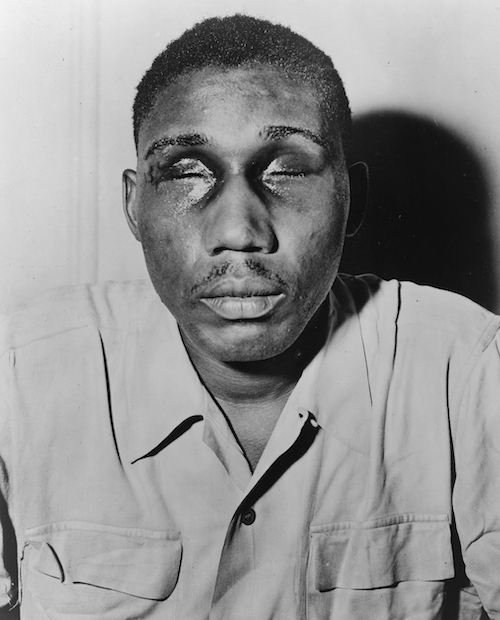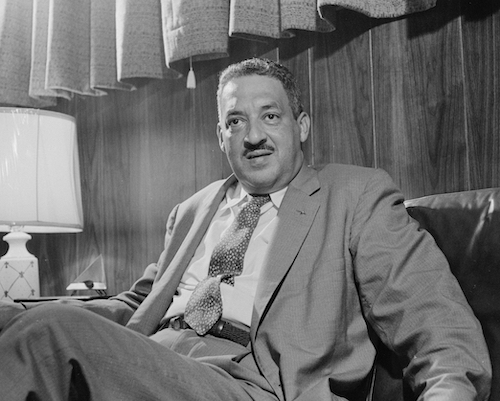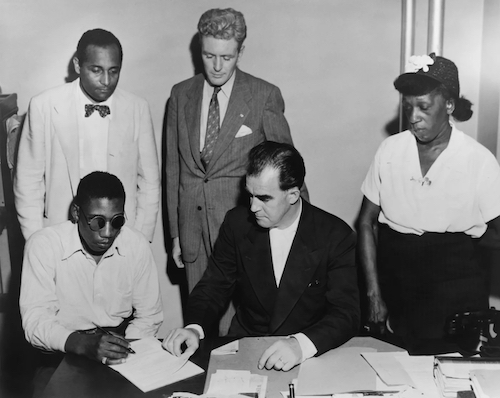Communiqué
Based on the book Unexampled Courage, “The Blinding of Isaac Woodard” on AMERICAN EXPERIENCE – March 30 at 9:00 pm
< < Back to ?p=264552American Experience “The Blinding of Isaac Woodard”
Premieres Tuesday, March 30, 2021 on PBS
How a Horrific Incident of Racial Violence Became a Powerful Catalyst for the Civil Rights Movement
In 1946, Isaac Woodard, a Black army sergeant on his way home to South Carolina after serving in WWII, was taken off a Greyhound bus after a heated exchange with the driver, who refused to let him off at a rest stop to use the restroom. The local chief of police savagely beat him, leaving him unconscious and permanently blind. The shocking incident made national headlines and, when the police chief was acquitted by an all-white jury, the blatant injustice would change the course of American history. Based on Richard Gergel’s book Unexampled Courage, the film details how the crime led to the racial awakenings of South Carolina Judge J. Waties Waring and President Harry Truman, who desegregated federal offices and the military two years later. The event also ultimately set the stage for the Supreme Court’s landmark 1954 Brown v. Board of Education decision, which finally outlawed segregation in public schools and jumpstarted the modern civil rights movement. Produced and directed by Jamila Ephron, executive produced by Cameo George, and narrated by André Holland (Moonlight), “The Blinding of Isaac Woodard” premieres Tuesday, March 30, 2021, 9:00-11:00 p.m. on American Experience on PBS, PBS.org and the PBS Video App.

‘“The Blinding of Isaac Woodard’ illustrates how a single individual can be the spark that ignites a movement and creates a seismic shift in public opinion,” said Cameo George, American Experience executive producer. “Although his name is little-known today, Isaac Woodard’s story changed hearts and minds—and the law of the land.”
Below is a timeline of events:
- February 12, 1946 – 27-year-old Isaac Woodard, recently discharged from the army and still in uniform, heads home to Winnsboro, South Carolina on a bus full of fellow soldiers, Black and white. Woodard asks the bus driver to stop so he can use the restroom; the driver relents but at the next stop summons two police officers who violently beat Woodard, gouge his eyes out and throw him in jail. One of many horrific incidents of violence faced by Black soldiers returning from the war, the case, along with several others, was investigated by the NAACP legal defense department, headed by Thurgood Marshall.
- April 23, 1946 – Woodard travels to New York City to meet with Walter White, Executive Secretary of the NAACP, in New York City, who is looking for cases to dramatize the nature of the Southern racial system to gain support. White enlists the help of Orson Welles, who publicizes Woodard’s story on his weekly radio show. The case becomes a national cause célèbre and the NAACP sends Woodard on a nationwide speaking tour.
- September 19, 1946 – Walter White and a delegation of religious and labor leaders meet with President Harry S. Truman, urging him to pass legislation prohibiting lynching. When White realizes Truman isn’t going to move forward, he tells the president, also a veteran, the story of Isaac Woodard. Truman is enraged. Five days later, the U. S. Attorney General orders federal prosecutors in South Carolina to initiate criminal proceedings against the man responsible for Woodard’s blinding, Police Chief Lynwood Shull.
- November 5, 1946 – Shull’s trial begins, presided over by Judge J. Waties Waring, a Charleston patrician. It concludes the same day with Shull acquitted by the all-white jury. Judge Waring and his wife are appalled at the blatant miscarriage of justice; Waring will devote the rest of his career to the fight against racism. The Warings become the targets of threats and violence.
- December 5, 1946 – President Truman signs an executive order establishing the President’s Committee on Civil Rights.
-

Thurgood Marshall. As head of the NAACP legal defense department, Marshall investigated Isaac Woodard’s case. Photo from 1957. June 28, 1947 – Truman accepts an invitation from Walter White to give the keynote address at the annual convention of the NAACP. “There is no justifiable reason for discrimination because of ancestry, or religion, or race, or color,” Truman says in his speech in front of the Lincoln Memorial. “We cannot any longer await the growth of a will to action in the slowest state or the most backward community. Our national government must show the way.”
- July 1948 – At the Democratic National Convention in Philadelphia, southern Democrats (colloquially called “Dixiecrats”) storm out of the convention hall, incensed by the civil rights plank in the party’s platform. Truman refuses to retreat and, on July 26, issues Executive Orders 9980 and 9981, integrating the military and federal government offices.
- May 28, 1951 – The trial of Briggs v. Elliott begins, a suit brought by a group of Black parents, who are frustrated by the poor state of their public school in rural Clarendon County, South Carolina. The case is tried by an NAACP team led by Thurgood Marshall and presented before a panel of three judges, including Judge Waring. Two days later, the Briggs plaintiffs lose the suit allowing “separate but equal” to stand in South Carolina. Waring writes a passionate dissent.
- May 17, 1954 – The Briggs case and four other similar school desegregation cases are consolidated into a single case, Brown v. Board of Education of Topeka, Kansas. The Supreme Court’s unanimous ruling outlaws segregation in public schools.
- September 23, 1992 – Isaac Woodard dies in the Bronx, New York, unaware of how his blinding and the miscarriage of justice that followed had emboldened a federal judge and a sitting president to pursue the destruction of legal segregation.

About the Participants
Nathaniel Briggs is the son of Harry and Eliza Briggs.
J.A. DeLaine, Jr. is the son of Rev. Joseph A. DeLaine, who was instrumental in the Briggs case.
Kari Frederickson is professor of history at the University of Alabama and the author of The Dixiecrat Revolt and the End of the Solid South, 1932-1968.
Belinda Gergel is a retired history professor at Columbia College and former city councilwoman.
Richard Gergel is a United States District Judge of the United States District Court for the District of South Carolina and author of Unexampled Courage: The Blinding of Isaac Woodard and the Awakening of President Harry S. Truman and Judge J. Waties Waring.
Sherrilyn Ifill is president of the NAACP Legal Defense Fund.
Rawn James is the author of Root and Branch: Charles Hamilton Houston, Thurgood Marshall, and the Struggle to End Segregation and The Double V: How Wars, Protest, and Harry Truman Desegregated America’s Military.
Gilbert King is the author of the Pulitzer Prize-winning Devil in the Grove: Thurgood Marshall, the Groveland Boys and the Dawn of a New America.
Kenneth Mack is the inaugural Lawrence D. Biele Professor of Law and Affiliate Professor of History at Harvard University and author of Representing the Race: The Creation of the Civil Rights Lawyer.
Patricia Sullivan is professor of history at the University of South Carolina and the author of Lift Every Voice: The NAACP and the Making of the Civil Rights Movement.
Laura Williams is Isaac Woodard’s great-niece.
Robert Young is Isaac Woodard’s nephew.
“The Blinding of Isaac Woodard”
| Written by | JAMILA EPHRON & MARK ZWONITZER | |
| Produced and Directed by | JAMILA EPHRON | |
| Edited by | NANCY NOVAK |
Based on the book Unexampled Courage by Richard Gergel
American Experience is a production of GBH Boston
| Executive Producer | CAMEO GEORGE |
About the Filmmakers
Jamila Ephron (Director/Producer/Co-Writer) has been producing and directing documentary films for 15 years. Her most recent film was George W. Bush, which premiered on American Experience in May 2020. Her previous film, Woodstock: Three Days That Defined a Generation, was released theatrically by PBS Distribution and premiered on American Experience in August 2019. Jamila also produced and co-directed Far from the Tree, based on the bestselling book by Andrew Solomon for Participant Media and Sundance Selects. Additional work for American Experience includes My Lai (winner of the Primetime Emmy and Peabody Award), The Assassination of Abraham Lincoln and Clinton. She co-produced Makers: Women Who Make America, a three-hour documentary on second wave feminism, and Cancer: The Emperor of All Maladies, based on the Pulitzer Prize-winning book by Siddhartha Mukherjee.
Cameo George (Executive Producer) is an Emmy Award-winning producer, writer and journalist with more than 20 years of experience in documentary, broadcast television and digital content production. George has produced, developed and commissioned innovative programming at CNN, NBC News, ABC News and digital media startup OZY.com. She was the senior producer of CNN’s groundbreaking series Black in America and Latino in America and the executive producer of the eight-hour PBS documentary series 16 for ’16: The Contenders, which was also broadcast on the BBC. George joined American Experience from ABC News, where she was Head of Development for Longform projects, responsible for creating a pipeline of docuseries and feature documentary films across Walt Disney Television platforms including ABC News, Hulu, National Geographic and Disney+.

